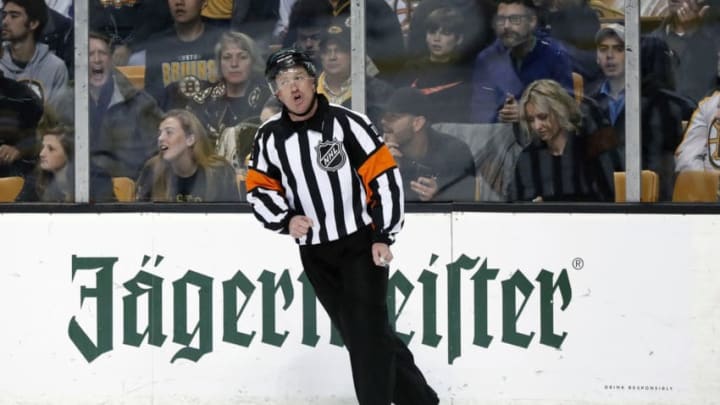The Boston Bruins and Tampa Bay Lightning series has been marred by some awful officiating. But its a league-wide epidemic that needs to be addressed.
Let me start off this article by saying that this terrible officiating in this series has not just affected the Boston Bruins. The Tampa Bay Lightning were also victimized a bit by the incredibly inconsistent and utterly unfathomable calls in this series. But other teams around the league have also seen phantom penalties and blatant no-calls that have negatively impacted the game.
The playoffs are when teams are expected to be at their best and perform to their fans expectations. Why are the NHL on-ice officials not being held to the same standard? It completely boggles my mind, and the mind of fans everywhere, at how the NHL isn’t trying to get this squared away.
Examples in this Series
For example, just in Game 2 between the Bruins and Lightning alone, there were SEVERAL instances of bad officiating. During a scrum early in the game, there were penalties called against Cedric Paquette of the Lightning and David Backes of the Bruins. Backes was given 4 minutes of penalty time for roughing (against the same player in Paquette), whereas Paquette was only given 2 minutes. A review of the scrum doesn’t shed any light onto why Backes got the extra 2, but the Lightning ended up on the power play.
This second instance is more even more infuriating. As Yanni Gourde skated the puck into the zone, Torey Krug gave him a light whack with the stick on the thigh, which was called a slash. Fine, if you want to call the game that tight, go for it…but keep it consistent. That penalty called led to a Tampa Bay power play and a goal.
But late in the 3rd period, down by only a goal, Brad Marchand skated in on a breakaway and was slashed on the hands by Anton Stralman that deprived him of the opportunity to get a shot off. Not only was a penalty shot not given, no penalty was called. Here’s a video to back that up:
Victor Hedman high sticks himself. Cool. pic.twitter.com/EaBN5CYPTG
— Dan (@bruinshockeynow) May 1, 2018
The last piece of the puzzle is the absolute worse of it all. In the 3rd period, down by a goal, Bruins forward David Pastrnak was called for a 4 minute, double-minor high sticking call against Victor Hedman. However, watching (not even that closely, as if you can see it at full speed), Pastrnak lifts Hedman’s stick and it is his own stick that hits him in the face and draws blood.
Hedman of course sells it well, and the Bruins killed it off. But that was 4 minutes of time that they could have been 5-on-5 trying to tie the game, but instead were shorthanded. Pastrnak was also boarded at the end of the game, but didn’t get the call on that either.
NHL on NBC analysts (and former players) Jeremy Roenick and Mike Milbury had some choice words for the NHL regarding the officiating after the game:
Jeremy Roenick BLASTS referees after many missed calls during a 4-2 #GoBolts win over #NHLBruins pic.twitter.com/IyFcxjgCeC
— Boston Bruins on CLNS (@BruinsCLNS) May 1, 2018
The officiating hasn’t gone all against Boston either. There were a few missed calls on icings, and Tampa Bay also ended up shorthanded after a scrum that involved multiple players that could have been sent off. The biggest issue is the inconsistency, not just game-to-game, but within the game itself. When a play like Krug’s is a slash in the 1st period, it has to be a slash against Stralman in the 3rd period. As Roenick said, it’s unacceptable, especially in the playoffs.
Next: Brad Marchand is the Dark Knight of Boston
If you want to call the game tight, call it tight against both teams. If you want to let them play, let them play. But make up your mind before the game starts.
